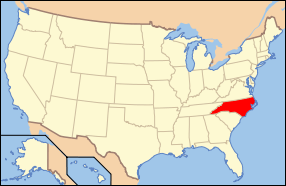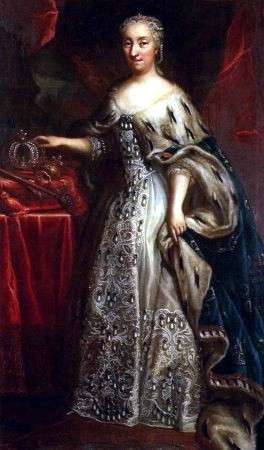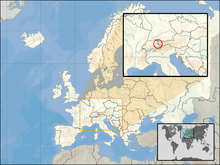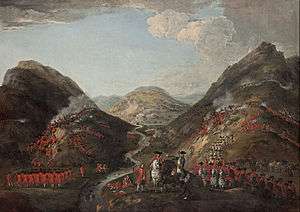1710s
| Millennium: | 2nd millennium |
| Centuries: | 17th century – 18th century – 19th century |
| Decades: | 1680s 1690s 1700s – 1710s – 1720s 1730s 1740s |
| Years: | 1710 1711 1712 1713 1714 1715 1716 1717 1718 1719 |
| 1710s-related categories: |
Births – Deaths – By country Establishments – Disestablishments |
Events
Contents: 1710 1711 1712 1713 1714 1715 1716 1717 1718 1719
1710
January–June
- February 28 (Swedish calendar) – Battle of Helsingborg: Fourteen thousand Danish invaders under Jørgen Rantzau are decisively defeated by an equally large Swedish army under Magnus Stenbock.
- April 10 – The world's first copyright legislation, Britain's Statute of Anne, becomes effective.[1]
- April 19 – Anne, Queen of Great Britain, meets the Four Mohawk Kings.[2]
- June – Protestant Swiss and German Palatines under the leadership of Christoph von Graffenried travel to Bath County in the Province of Carolina. The settlers displace the native town of Chattoka and found New Bern, named for von Graffenried's hometown of Bern, Switzerland.
- June 8 – The Tuscarora nation sends a petition to the Province of Pennsylvania, protesting the seizure of their lands and enslavement of their people by citizens of the Province of Carolina.
July–December
- August 20 – War of the Spanish Succession: Battle of Saragossa: The Spanish-Bourbon army commanded by the Marquis de Bay is soundly defeated by the forces of the Habsburg Monarchy under Guido Starhemberg and their allies.[3]
- October 13 – Queen Anne's War: The French surrender ending the Siege of Port Royal gives the British permanent possession of Nova Scotia.
Date unknown
- In Sweden, the Royal Society of Sciences in Uppsala is founded as the Collegium curiosorum.
- John Smithwick begins brewing Smithwick's ale at Kilkenny, Ireland (St. Francis Abbey Brewery).[4]
- Beijing becomes the largest city of the world, taking the lead from Istanbul.[5]
1711

January: North Carolina.
January–June
- January – Cary's Rebellion: The Lords Proprietor appoint Edward Hyde to replace Thomas Cary as the governor of the North Carolina portion of the Province of Carolina. Hyde's policies are deemed hostile to Quaker interests, leading former governor Cary and his Quaker allies to take up arms against the province.
- February – French settlers at Fort Louis de la Mobile celebrate Mardi Gras in Mobile (Alabama) by parading a large papier-mache ox head on a cart (the first Mardi Gras parade in America).
- February 24
- Thomas Cary, after declaring himself Governor of North Carolina, sails an armed brigantine up the Chowan River to attack Governor Hyde's forces fortified at Colonel Thomas Pollock's plantation. The attack fails and Cary's forces retreat.
- London première of Rinaldo by George Frideric Handel, the first Italian opera written for the London stage.[6]
July–December
- July 21 – The Treaty of the Pruth is signed between the Ottoman Empire and Russia.
- July – Cary's Rebellion: Lieutenant Governor Alexander Spotswood of Virginia dispatches a company of Royal marines to assist Governor Hyde. After hearing of this, Cary's troops abandon all of their fortifications along the Pamlico River. Cary and many of his supporters are soon caught and sent to England as prisoners, ending Cary's Rebellion.
- August 22 – The Quebec Expedition, a British attempt to attack Quebec as part of Queen Anne's War, fails when 8 of its ships are wrecked in the Saint Lawrence River and 850 soldiers drown.
- September 8 – The South Sea Company receives a Royal Charter in Britain.[7]
- September 10 (also dated September 12) – John Lawson, Christoph von Graffenried, 2 African American slaves and 2 Native Americans leave on an exploration expedition from New Bern, and travel north by canoe up the Neuse River.
- September 14 (approximate date) – Tuscarora natives capture John Lawson, Christoph von Graffenried and their expeditionary party and bring them to Catechna.
- September 16 (approximate date) – Tuscarora natives kill John Lawson. Christoph von Graffenried and one African American slave are known to have been set free.
- September 22 – Tuscarora War begins when Tuscarora natives under the command of Chief Hancock raid settlements along the south bank of the Pamlico River within the Province of Carolina (modern-day North Carolina), killing around 130 people.
- October 14 – Yostos kills Tewoflos, becoming Emperor of Ethiopia.
Date unknown
- Alexander Pope publishes the poem An Essay on Criticism in London.
- John Shore invents the tuning fork.
1712
January–June
- February 10 – A Huilliche rebellion begins in Chiloé Archipelago.
- February 30 – Sweden temporarily adopts February 30 as a day to adjust the Swedish Calendar back to the Julian calendar.
- May 19 – Peter the Great moves the capital of Russia from Moscow to Saint Petersburg.
- May 22 – Charles VI, Holy Roman Emperor crowned king of Hungary.
July–December
- July 24
- Battle of Denain: The French defeat a combined Dutch-Austrian force.
- Battle of Villmergen: Reformed cantons of Switzerland defeat the Catholic cantons.
- December 9 – Battle of Gadebusch: Sweden defeats Denmark and Saxony.
Date unknown

Newcomen steam engine diagram
- The Treaty of Aargau is signed by Catholics and Protestants, establishing Protestant dominance in Switzerland, while preserving the rights of Catholics.
- The first known working Newcomen steam engine is built by Thomas Newcomen with John Calley to pump water out of mines in the Black Country of England, the first practical device to harness the power of steam to produce mechanical work.[8]
- After many years of settlement, the "Town on Queen Anne's Creek" is established as a courthouse for Chowan County, North Carolina. The town is renamed Edenton in 1720 and incorporated in 1722.
- The VOC Zuytdorp is wrecked off the coast of Western Australia.
- John Arbuthnot creates the character of John Bull to represent Britain.
1713
January–June
- January 17 – Tuscarora War: Colonel James Moore leads the Carolina militia out of Albemarle County, North Carolina in a second offensive against the Tuscarora. Heavy snows force the troops to take refuge in Fort Reading on the Pamlico River.
- February 1 – Skirmish at Bender
- February 4 – Tuscarora War: The Carolina militia under Colonel James Moore leaves Fort Reading to continue the campaign against the Tuscarora.

Frederick William I of Prussia, 1713
- February 25 – Frederick William I of Prussia begins his reign.
- March 1 – Tuscarora War: Colonel James Moore's Carolina militia lays siege to the Tuscaroran stronghold of Fort Neoheroka, located a few miles up Contentnea Creek from Fort Hancock.
- March 20 – Tuscarora War: Colonel James Moore's Carolina militia launches a major offensive against Fort Neoheroka.
- March 23 – Tuscarora War: Fort Neoheroka falls to the Carolina militia, effectively ending the Tuscarora nation's military strength. Two Tuscaroran allies, the Machapunga and Coree tribes, continue offensive actions against North Carolina.

Western Europe Treaty
- March 27 – First Treaty of Utrecht between Great Britain and Spain. Philip V accepted by Britain and Austria as king of Spain; Spain cedes Gibraltar and Minorca to Britain.[6][9]
- April 11 – Second Treaty of Utrecht between Britain and France ends the War of the Spanish Succession.[10] France cedes Newfoundland, Acadia, Hudson Bay and St Kitts to Britain.[6]
- April 14 – First performance, in London, of Joseph Addison's libertarian play Cato, a Tragedy, which will be influential on both sides of the Atlantic.[11]
- April 19 – With no living male heirs, Charles VI, Holy Roman Emperor, issues the Pragmatic Sanction of 1713 to ensure one of his daughters will inherit the Habsburg lands.
- June 1 (approx.) – Tuscarora War: Colonel James Moore leads the Carolina militia into the Pamlico Peninsula to defeat the Machapunga and Coree tribes.
- June 23 – French residents of Acadia given one year to declare allegiance to Great Britain or leave Nova Scotia.
July–December
- July 13 – The Treaty of Portsmouth brings an end to Queen Anne's War.
- September 1 – Tuscarora War: The Carolina militia led by Colonel James Moore returns to South Carolina after mixed success in the campaign against the Machapunga and Coree.
Date unknown
- Ars Conjectandi, a seminal work on probability by Jacob Bernoulli is published eight years after his death, by his nephew, Niklaus Bernoulli.
1714
January–June
- March 7 – Treaty of Rastatt signed between Austria and France concluding the War of the Spanish Succession between them. Austria receives from Spain, Spanish territories in Italy – the Kingdom of Naples, Duchy of Milan and Kingdom of Sardinia – as well as the Southern Netherlands; and from France Freiburg and Landau. The Austrian Habsburg Empire reaches its largest territorial extent yet with Charles VI, Holy Roman Emperor, succeeding Philip V of Spain as ruler in the ceded territories.
- May 19 – Anne, Queen of Great Britain, refuses to allow members of the House of Hanover to settle in Britain during her lifetime.[12]
July–December
- July – Longitude prize: The Parliament of Great Britain votes "to offer a reward for such person or persons as shall discover the Longitude." (£10,000 for any method capable of determining a ship's longitude within 1 degree; £15,000, within 40 minutes, and £20,000 within ½ a degree.)
- July 27 – The Imperial Russian Navy gains its first important victory, against the Swedish Navy in the Battle of Gangut.
- August 1 – George, elector of Hanover becomes King George I of Great Britain and Ireland on the death of Queen Anne.
- September 11 – War of the Spanish Succession: Barcelona taken after a long siege and Catalonia surrenders to Spanish and French Bourbon armies.
- December 9 – Ottoman–Venetian War (1714–1718): The Ottoman Empire declares war on the Republic of Venice.
Date unknown
- Archbishop Tenison's School, the world's earliest surviving mixed gender school, is established by Thomas Tenison, Archbishop of Canterbury, in Croydon, south of London, England.
- Louis Juchereau de St. Denis establishes Fort St. Jean Baptiste at the site of present day Natchitoches, Louisiana (the first permanent European settlement in the Louisiana Territory, after Biloxi (1699) and Mobile, Alabama (1702) were separated).
- Worcester College, University of Oxford is founded (formerly Gloucester College, closed during the Dissolution of the Monasteries).
- Stockholm County founded.
- Redirection of the river Kander (Switzerland) into Lake Thun.
1715
January–June
- February 11 – Tuscarora War: The Tuscarora and their allies sign a peace treaty with the Province of Carolina and agree to move to a reservation near Lake Mattamuskeet, effectively ending the Tuscarora War. Large numbers of Tuscarora subsequently move to New York.
- March 27 – Henry St John, 1st Viscount Bolingbroke, flees from Great Britain to France. His part in secret negotiations with France leading to the Treaty of Utrecht has cast suspicion on him in the eyes of the Whig government of Britain. He becomes secretary of state to the Pretender, James Edward Stuart.[13]
- May 3 – A total solar eclipse is seen across southern England, Sweden and Finland (the last total eclipse visible in London for almost 900 years).
July–December
- July 20 – Ottoman–Venetian War (1714–18): The fall of Nauplion, the capital of the Venetian "Kingdom of the Morea", seals the fate of the Peloponnese peninsula, which is soon completely retaken by the Ottomans.
- July 24 – 1715 Treasure Fleet: A Spanish treasure fleet of 10 ships under General Don Juan Ubilla leaves Havana, Cuba for Spain. Seven days later, nine of them sink in a storm off the coast of Florida (some centuries later, treasure salvage is found from these wrecks).
- August 31 – Opening of Old Dock, Liverpool, England, the world's first enclosed commercial wet dock (Thomas Steers, engineer).[14][15]
- September – The first major Jacobite rising in Scotland against the rule of King George I of Great Britain breaks out. The Earl of Mar raises the standard of James Edward Stuart and marches on Edinburgh. James, the son of the deposed King James VII, arrives from France.
- September 1 – King Louis XIV of France dies after a reign of 72 years, leaving his throne to his great-grandson Louis XV, who will reign for 58 years. Regent for the new, 5-year-old monarch is Philippe d'Orléans, nephew of Louis XIV.
- November 13 – The Battle of Sheriffmuir during the Jacobite rising in Scotland. Although the action is inconclusive, the forces of the Kingdom of Great Britain led by John Campbell, 2nd Duke of Argyll, halt the Jacobite advance.
- November 14 – Battle of Preston: Government forces defeat the Jacobite incursion at the conclusion of a five-day siege and action.
- November 15 – Third Barrier Treaty signed by Britain, the Holy Roman Empire and the Dutch Republic.[10]
- November 28 – Application of Nueva Planta decrees in Majorca and the other Balearic Islands formerly under the Crown of Aragon bringing them under the laws of the Crown of Castile.
- December 22 – James Edward Stuart rejoins Jacobite rebels in Scotland[13] but fails to rouse his army.
- December 24 – Swedish troops occupy Norway.
Date unknown
- Yamasee War: the Province of Carolina goes to war with the Yamasee Native Americans.
- Karlsruhe Palace is built, resulting in the town of Karlsruhe growing up around it.
- The ancient right to evaluate royal decrees publicly before they are given the force of law by the high court of Paris (the Parlement) is restored.
- Filippo Juvarra starts working on the previously postponed construction of the church of Santa Christina in Turin.
- Filippo Juvarra starts rebuilding the church of San Filippo Neri, Turin in which the roof had collapsed during the siege of Turin during the War of the Spanish Succession.
- Around this year a Breech Loading firearm was made for Philip V of Spain.

Breech-loading firearm that belonged to Philip V of Spain, made by A. Tienza, Madrid circa 1715. It came with a ready-to-load reusable cartridge. This is a miquelet system.
- According to Coffee: A Dark History coffee has been grown in the French colony of Saint-Domingue since this year.
- John Moore becomes Peerage of Ireland during October.
1716
January–June
- January – The town of Crieff, Scotland, is burned to the ground by Jacobites returning from the Battle of Sheriffmuir.[16]
- January 16 – Application of Nueva Planta decrees to Catalonia, making it subject to the laws of the Crown of Castile and abolishing the Principality of Catalonia as political entity, concluding the unification of Spain under Philip V.[17]
- January 27 – The Tugaloo Massacre changes the course of the Yamasee War.
- February 10 – James Edward Stuart flees from Scotland to France with a handful of supporters following failure of the Jacobite rising of 1715.
- February 24 – Execution of the Jacobite leaders James Radclyffe, 3rd Earl of Derwentwater and William Gordon, 6th Viscount of Kenmure in London.[18]
- May – John Law founds the Banque Générale.
- May 26 – Two regular companies of field artillery, each 100 men strong, are raised at Woolwich by Royal Warrant of King George I of Great Britain.
- May 28 – John Churchill, 1st Duke of Marlborough, suffers a paralytic stroke.
July–December
- July 5 – Prince Ernest Augustus is created Duke of York and Albany in the peerage of Great Britain.
- July 8 – The Swedish fleet is defeated by a Danish–Norwegian fleet in the Battle of Dynekilen.
- August 4 – George Seton, 5th Earl of Winton, under sentence of death for his part in the Jacobite rising of 1715, escapes from the Tower of London and flees into exile on the continent.
- August 5 – Battle of Petrovaradin: 83,300 Austrian troops of Prince Eugene of Savoy defeat 150,000 Ottoman Turks under Silahdar Damat Ali Pasha (who is killed).
- August 24 – Charles VII, Holy Roman Emperor, returns from Italy.
- November 9 – Caroline of Ansbach, Princess of Wales, gives birth to a stillborn son in London.
- December 12 – Charles Townshend, 2nd Viscount Townshend, is demoted from his office as Secretary of State for the Northern Department in the British government and replaced by James Stanhope, 1st Earl Stanhope.
Date unknown
- The English pirate Edward Teach is given command of a sloop in the Bahamas.[19]
- Natchez, one of the oldest towns on the Mississippi, is founded.
- A fire in Wapping, England, destroys 150 houses.
- Tsar Peter the Great of Russia studies with the physician Herman Boerhaave at Leiden University.
- The Kangxi Dictionary is published, laying the foundation of most references to Han characters studied today.
1717
January–June
- January 1 – Count Carl Gyllenborg, the Swedish ambassador to the Kingdom of Great Britain, is arrested in London over a plot to assist the Pretender to the British throne, James Francis Edward Stuart.[20]
- January 4 (December 24, 1716 Old Style) – Great Britain, France and the Dutch Republic sign the Triple Alliance[20] in an attempt to maintain the Treaty of Utrecht (1713), Britain having signed a preliminary alliance with France on November 28 (November 17) 1716.
- February – Following the treaty between France and Britain, James Stuart leaves France and seeks refuge with Pope Clement XI.[20]
- February 1 – The Silent Sejm, in the Polish-Lithuanian Commonwealth, marks the beginning of the Russian Empire's increasing influence and control over the Commonwealth.
- February 26–March 6 – What is now the northeastern United States is paralyzed by a series of blizzards that bury the region.
- March 2 – Dancer John Weaver performs in the first ballet in Britain, shown at the Theatre Royal, Drury Lane, The Loves of Mars and Venus.
- March 31 – Benjamin Hoadly, Bishop of Bangor, brings the Bangorian Controversy within the Church of England into the open by delivering a sermon to, and supposedly at the request of, King George I of Great Britain on The Nature of the Kingdom of Christ with the text "My kingdom is not of this world" (John 18:36), concluding there is no Biblical justification for church government.[21]
- April 26 – The Whydah Gally, flagship of "Black Sam" Bellamy, is wrecked in a storm off Wellfleet, Massachusetts. The Whydah sinks with a reputed four and a half tons of treasure on board, and all but two of her crew are lost, including Bellamy.
- May 27 – Spain unites its South American colonies as the Viceroyalty of New Granada.
- June 24 – The Premier Grand Lodge of England, the 'Modern' and first Free-Masonic Grand Lodge (which merges with the Ancient Grand Lodge of England in 1813 to form the United Grand Lodge of England), is founded in London.
July–December
- August 17 – The month-long Siege of Belgrade ends with Prince Eugene of Savoy's Austrian troops capturing the city from the Ottoman Empire.
- September – The first known Druid revival ceremony is held by John Toland at Primrose Hill, in London, at the Autumnal Equinox, to found the Mother Grove, what is later to become the Ancient Order of Druids.
- September 29 – Guatemala earthquake: A 7.4 magnitude earthquake strikes Antigua Guatemala, destroying much of the city and making authorities consider moving the capital of Guatemala to a different location.
- November
- Crews on two ships commanded by Benjamin Hornigold and Edward Teach attack and capture the British-built French Guineaman Concorde in the eastern Caribbean. Hornigold soon accepts a British amnesty for all pirates, but Teach rejects it and subsequently becomes known as Blackbeard.
- A rift between George I of Great Britain and his son the Prince of Wales leads to the latter being banished from the royal household.
- December – Blackbeard teams up with Stede Bonnet but later takes his ship and demotes Bonnet to guest. The Queen Anne's Revenge and Revenge take several ships as prizes in the Caribbean. Blackbeard eventually adds two more ships to his party and sails north to the North American coast.
- December 24–December 25 – Christmas flood: A disastrous flood hits the North Sea coast between the Netherlands and Denmark; thousands die or lose their houses.
Date unknown

Charleville musket model 1766
- 1717 Omani invasion of Bahrain.
- François-Marie Arouet is sentenced to imprisonment in the Bastille for eleven months because of a satirical verse against the Régent of France and his infamous daughter Marie Louise Élisabeth d'Orléans who at the time was hiding an illegitimate pregnancy and soon to give birth;[22] Arouet will emerge with the pseudonym Voltaire and the completed text of his first play, Œdipe.
- Tatar invasions in Transylvania, with many towns devastated, including Cavnic, Sighet and Dej.
- Lady Mary Wortley Montagu, wife of the British ambassador to Istanbul, has her son inoculated.
- Casa de Contratación ("House of Trade") is set up in Cádiz.
- Maharaja Pamheiba of Manipur is converted to Hinduism by Shantidas Goswami, and decrees it to be the official religion of his state.
- Most recent rupture of New Zealand's Alpine Fault with an earthquake estimated to have had a magnitude between 7.8 and 8.1.
- The Charleville musket enters service in France
- Thomas Fairchild, a nurseryman at Hoxton in the East End of London, becomes the first person to produce a successful scientific plant hybrid, Dianthus Caryophyllus barbatus, known as "Fairchild's Mule".[23]
1718
January–June
- January – France declares war on Spain, leading to the 2-year War of the Quadruple Alliance.

December 10: Flag of Stede Bonnet.
- May – English pirate Blackbeard leads 400 sailors in four ships to blockade the port of Charleston, South Carolina. The Queen Anne's Revenge and Adventure are both lost at Beaufort Inlet, North Carolina, a week later. Blackbeard allows Stede Bonnet to command the Revenge (which is renamed the Royal James) once again. Bonnet rescues 25 sailors abandoned by Blackbeard on a sandbar and continues his life of piracy.
- May 7 – New Orleans, is founded.
- June – Blackbeard and Bonnet take refuge in Bath, North Carolina, where Governor Charles Eden pardons them and their crew.
July–December
- July 21 – The Treaty of Passarowitz is signed.
- August 11 – Battle of Cape Passaro: a Spanish fleet is defeated by the British Royal Navy under Admiral George Byng off Capo Passero, Sicily, a prelude to the War of the Quadruple Alliance.
- September – The Dzungar Khanate destroys a Qing army at the Battle of the Salween River.
- October – Stede Bonnet and his crew are captured near the mouth of the Cape Fear River and taken to Charleston, South Carolina, where they are tried for piracy. All but four are found guilty and sentenced to death.
- October 24 – Stede Bonnet escapes from prison.
- November 8 – 22 of Stede Bonnet's pirate crew are hanged at Charleston.
- November 11 – Lightning strikes the powder magazine at the Old Fortress, Corfu, causing a major catastrophe on the island.
- November 18 – Voltaire's first play, Oedipus, premières at the Comédie-Française in Paris. This is his first use of the pseudonym.
- November 22 – Citing violations of the amnesty agreement with Blackbeard, Virginia Governor Alexander Spotswood sends a Royal Navy contingent to North Carolina, where they battle Blackbeard and his crew in Ocracoke Inlet. Blackbeard is killed in action after receiving five musketball wounds and twenty sword lacerations.
- December 5 – Following the death of Charles XII on November 30, his sister Ulrika Eleonora proclaims herself Queen regnant of Sweden, as the news of her brother's death reaches Stockholm.
- December 10 – Stede Bonnet is hanged at Charleston after being recaptured.
- December 17 – The Holy Roman Empire, Kingdom of Great Britain and Dutch Republic join the Kingdom of France in formally declaring war on Spain, launching the War of the Quadruple Alliance.
Date unknown
- Islamization of Sudan: The Funj warrior aristocracy deposes the reigning mek and places one of their own ranks on the throne of Sennar.
- The white potato reaches New England from England.
- According to Coffee: A Dark History had been growing in the Dutch colony of Surinam since this year.
1719
January–June
- January 23
- The Principality of Liechtenstein is created within the Holy Roman Empire.[24]
- The Riksdag of the Estates recognizes Ulrika Eleonora's claim to the Swedish throne, after she has agreed to sign a new Swedish constitution. Thus, she is recognized as Queen regnant of Sweden.
- February 20 – The first Treaty of Stockholm is signed.
- April 19 – In Louisiana (New France), Bienville's brother Serigny arrives on a French man-of-war, bringing news that war was declared between France and Spain (from December 1718).
- April 25 – Daniel Defoe publishes Robinson Crusoe.
- April – French army under James FitzJames, 1st Duke of Berwick invades the Basque provinces of Spain.
- May 14 – In Louisiana (New France), at war with Spain, Bienville, from Mobile, captures Pensacola, but Pensacola is later recaptured by the Spanish, and again re-taken by Bienville.[25]
- June 4 – Battle of Ösel Island: A Russian naval force defeats the Swedish fleet.
- June 10 – Battle of Glen Shiel: British forces defeat the Jacobites and their Spanish allies.
- June 20 – Austrians are defeated in the Battle of Francavilla.
July–December
- December 22 – Andrew Bradford publishes the American Weekly Mercury, Pennsylvania's first newspaper.
Date unknown
- Prussia conducts Europe's first systematic census.
- Miners in Falun, Sweden find the apparently petrified body of Fet-Mats Israelsson in an unused part of the copper mine.
- Raine's Foundation School, Bethnal Green, opens in Wapping (opened by Henry Raine).
- Thomas Elfe, born in 1719 was a successful colonial period furniture craftsman in Charleston, South Carolina.
References
- ↑ Penguin Pocket On This Day. Penguin Reference Library. 2006. ISBN 0-14-102715-0.
- ↑ "Mashantucket Pequot Museum and Research Center". Archived from the original on November 21, 2007. Retrieved 2007-12-16.
- ↑ Kamen, Henry (2000). Felipe V, el rey que reinó dos veces. Historia (3rd ed.). Madrid: Temas de Hoy. pp. 96–97. ISBN 8478808477.
- ↑ "Smithwick's History". Smithwick's. Retrieved 2012-07-16.
- ↑ 1987 estimate. Rosenberg, Matt T. "Largest Cities Through History". About.com Geography. Retrieved 2012-08-20.
- 1 2 3 Williams, Hywel (2005). Cassell's Chronology of World History. London: Weidenfeld & Nicolson. ISBN 0-304-35730-8.
- ↑ "Royal Charters, Privy Council website". Archived from the original on August 24, 2007. Retrieved 2007-08-24.
- ↑ Rolt, L. T. C.; Allen, J. S. (1977). "The First Newcomen Engines c1710-15". The Steam Engine of Thomas Newcomen (new ed.). Hartington: Moorland. pp. 44–57. ISBN 0-903485-42-7.
- ↑ Jackson, William G. F. (1986). The Rock of the Gibraltarians. Cranbury, NJ: Associated University Presses. pp. 113, 333–34. ISBN 0-8386-3237-8.
- 1 2 Cates, William L. R. (1863). The Pocket Date Book. London: Chapman and Hall.
- ↑ Litto, Fredric M. (1966). "Addison's Cato in the Colonies". William and Mary Quarterly. 23: 431–449. JSTOR 1919239.
- ↑ Palmer, Alan; Veronica (1992). The Chronology of British History. London: Century Ltd. pp. 208–209. ISBN 0-7126-5616-2.
- 1 2 Williams, Hywel (2005). Cassell's Chronology of World History. London: Weidenfeld & Nicolson. pp. 294–295. ISBN 0-304-35730-8.
- ↑ "Trading Places: Old Dock History". Liverpool Museums. Archived from the original on March 24, 2008. Retrieved 2008-03-24.
- ↑ "Liverpool: The docks". A History of the County of Lancaster: Volume 4. British History Online. 1911. pp. 41–43. Retrieved 2008-03-24.
- ↑ "The Burning of The Strathearn Towns & Villages: Part Two". PertshireCrieffStrathearn Local History. 2012-07-15. Retrieved 2013-02-25.
- ↑ Payne, Stanley G. "Chapter 16: The Eighteenth-Century Bourbon Regime in Spain". A History of Spain and Portugal. 2. Madison: University of Wisconsin Press. ISBN 0-299-06270-8. Retrieved 2008-04-17.
- ↑ Everett, Jason M., ed. (2006). "1716". The People's Chronology. Thomson Gale. Retrieved 2007-05-26.
- ↑ Lee, Robert E. (1974). Blackbeard the Pirate (2002 ed.). North Carolina: John F. Blair. ISBN 0-89587-032-0.
- 1 2 3 Williams, Hywel (2005). Cassell's Chronology of World History. London: Weidenfeld & Nicolson. pp. 295–296. ISBN 0-304-35730-8.
- ↑ Starkie, Andrew (2007). The Church of England and the Bangorian controversy, 1716-1721. Woodbridge: Boydell Press. ISBN 978-1-84383-288-1.
- ↑ Raynaud, Jean-Michel (1983). Voltaire soi-disant. 1. Presses Universitaires de Lille. p. 289. ISBN 2859392157.
- ↑ The Gentle Author (2011-07-02). "Thomas Fairchild, Gardener of Hoxton". Spitalfields Life. Retrieved 2015-11-16.
- ↑ "Historical Events for Year 1719 | OnThisDay.com". Historyorb.com. Retrieved 2016-06-24.
- ↑ "Le Moyne de Bienville, Jean-Baptiste", University of Toronto, 2000, webpage:biog-ca-Bienville.
This article is issued from Wikipedia - version of the 2/27/2016. The text is available under the Creative Commons Attribution/Share Alike but additional terms may apply for the media files.




